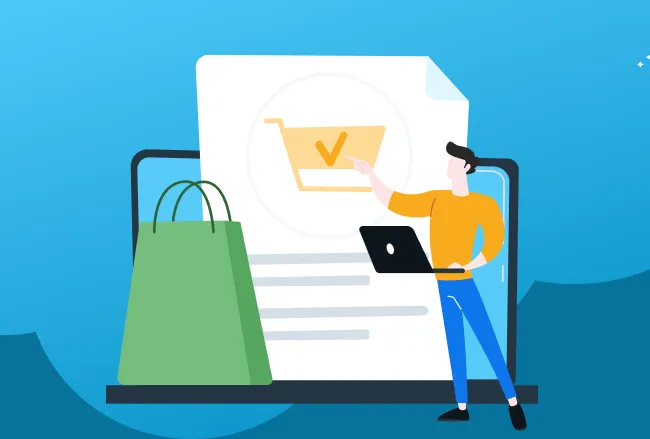
The retail industry has transformed drastically, especially after the COVID-19 impact. For example, online retail sales saw a substantial boost, reaching $303.1 billion in the fourth quarter of 2022, which was 23.4% higher than the average for the first nine months of the year. This growth represented 16.3% of all retail sales, compared to 12.4% pre-pandemic, indicating a lasting shift in consumer behavior towards e-commerce, even as physical stores reopened.
Salesforce in the retail industry is pivotal in this change, offering tools like Einstein AI for deeper customer insights and better inventory management. More details about Salesforce Einstein can be found in How to Use Salesforce Einstein. Shops can now connect closely with customers, offering personalized services and staying ahead in the market. Salesforce for the retail industry is not just a solution; it’s a game-changer for retail businesses aiming to thrive in this new era.
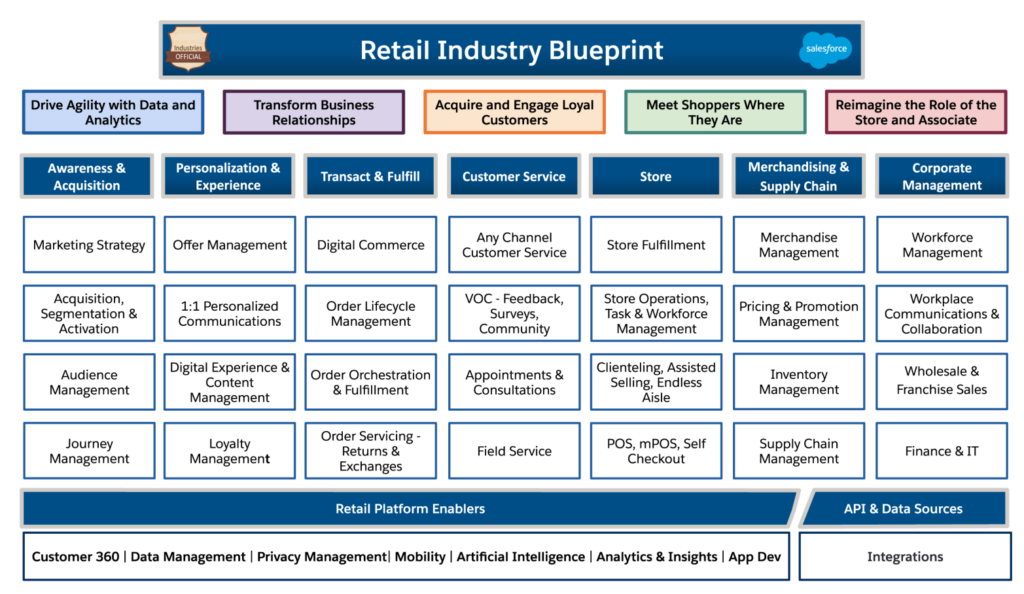
In retail, a typical customer relationship lifecycle can be split into seven phases:
- Awareness and Acquisition: Catching customer attention.
- Personalization and Experience: Tailoring the shopping experience.
- Transact and Fulfill: Processing and delivering purchases.
- Customer Service: Assisting and resolving issues.
- Store: Physical retail operations.
- Merchandising and Supply Chain: Managing stock and supply.
- Corporate Management: Overarching business operations.
These phases encompass five key areas:
- Utilizing Data for Agility
- Transforming Business Relationships
- Acquiring and Retaining Loyal Customers
- Reaching Shoppers Everywhere
- Rethinking Store Roles.
Addressing these areas at each lifecycle stage is crucial for retail success. Now let’s dive into the world of retail and explore how to implement Salesforce in retail business. In this article you will learn:
- Salesforce in Retail Brief Overview and Its Importance
- Salesforce Solutions for the Retail Industry: Which to Choose?
- Overview of Salesforce Retail Solutions
- Retail Salesforce Solution Architecture
- Salesforce Main Solutions List for the Retail Industry
- Commerce Cloud for Retail
- Marketing Cloud for the Retail Industry
- Sales Cloud for Retail Companies
- Service Cloud for Retail and Consumer Goods
- Experience Cloud for Retail Businesses
- Heroku for Retail
- MuleSoft in Retail
- Customer 360 Salesforce CRM for Retail
- How Much Salesforce Implementation in Retail Cost
- Specific Retail Solutions: Where Salesforce Retail Services Shine
- Must-Have Salesforce Apps for Retail
- FAQs about Salesforce Retail Execution and Implementation
- Conclusion
Brief Overview
Salesforce CRM in retail helps sellers understand and respond to what customers want. It uses clean data and smart ways to profile and segment customers. This means you can market better and serve customers well. It also connects everyone in the sales team so they have the info they need. This helps make customers happy and loyal.
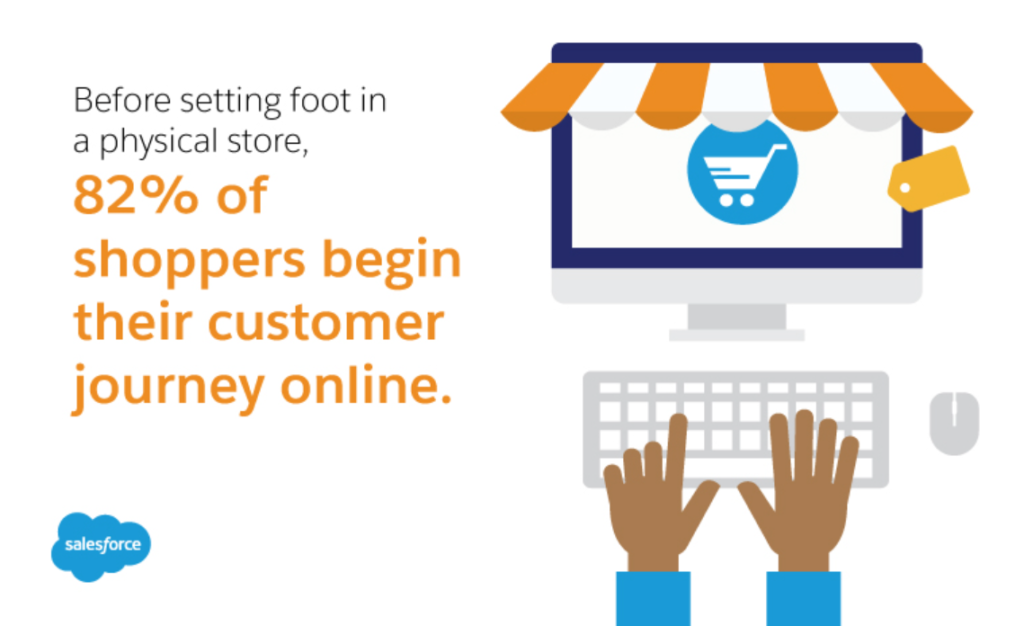
Insight:
How to Use Salesforce in Retail?
Here is a real-life business case:
Consider a growing fashion store with inventory issues. Salesforce’s Inventory Management could give them real-time stock updates and better supply chain control, cutting down on excess and improving accuracy.
Also, imagine an online shop wanting better customer relations. Salesforce’s Customer 360 might offer a complete view of each customer, helping them tailor recommendations and marketing, potentially boosting loyalty and repeat buys.
These examples show how Salesforce in retail can solve specific retail challenges.
Additionally, Salesforce offers solutions for retail-specific requirements like inventory management. Inventory management in retail tracks and manages stock levels and orders effectively. Stores send requests to the manufacturer’s head office, which then places orders with vendors. The vendors deliver the products to warehouses, distribute them to retail and wholesale stores, and ultimately sell them to customers.
Below you may see how to set up inventory management in Salesforce for the retail industry in form of a diagram:
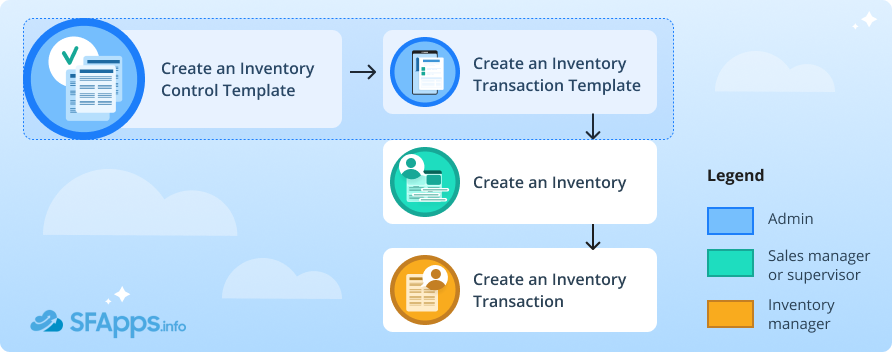
Image Source: Salesforce Help, Set Up Inventory Management
Importance of CRM in Retail
Salesforce CRM is now key in retail. Salesforce lets businesses grasp customer habits, likes, and trends. Using Salesforce CRM, shops can give unique experiences and make customers loyal, boosting sales. Salesforce’s CRM solutions help shops interact with customers through many channels, foresee their needs, and quickly respond, enhancing the shopping experience.

Image Source: Salesforce Products, Retail
Salesforce Solutions for the Retail Industry: Which to Choose?
Overview of Salesforce Retail Solutions
For a successful business scenario implementation, it’s crucial to follow established best practices and carefully select the right solutions and products tailored to your organization’s specific needs. This approach ensures a more effective and efficient process, leading to better results.
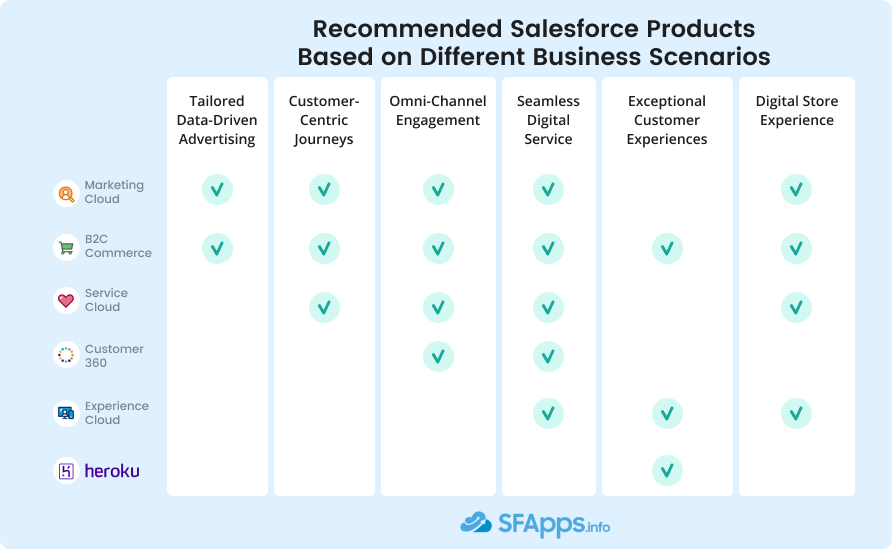
Let’s explore customer-focused business scenarios:
- Tailored Data-Driven Advertising: Meet customer expectations with personalized, secure, and privacy-compliant ads on all their devices.
- Customer-Centric Journeys: Boost engagement and sales through relevant, tailored customer journeys.
- Omni-Channel Engagement: Integrate marketing and commerce to adapt to customer preferences and drive sales with intelligent, behavior-based communication.
- Seamless Digital Service: Enhance customer service with easy access to essential information and quick issue resolution.
- Exceptional Customer Experiences: Offer engaging, multilingual apps integrated with your CRM and other systems.
- Digital Store Experience: Adapt swiftly to the digital evolution in retail for customers and employees.
- Understand Capability Maturity: Success requires reaching certain maturity levels, divided into five stages.
Here you can find recommendations by Salesforce solutions for retail and products for different scenarios:
Data-Driven Advertising: Start by analyzing your customer data. Dive into this valuable resource to gain a profound understanding of your target audience. Utilize this knowledge to enhance personalization and expand your reach through secure, precisely targeted campaigns.
Recommended Products:
- Marketing Cloud
- B2C Commerce
Customer-Centric Journeys: Enhance marketing through smart, focused messages with personalization. Salesforce enables better customer understanding, personalized messaging, and efficient shopper engagement at scale.
Recommended Products:
- Marketing Cloud
- B2C Commerce
- Service Cloud
Omni-Channel Engagement: Integrate marketing and commerce to meet customer preferences and deliver intelligent, behavior-based communication that drives sales. Shoppers demand personalized, relevant messages across all touchpoints, including in-store, online, and on social media. Achieving this goal involves connecting people and technology areas within your business to create seamless solutions.
Recommended Products:
- Marketing Cloud
- B2C Commerce
- Service Cloud
- Customer 360
Digital Service: Enhance customer service by providing fast and convenient access to necessary information for task completion and issue resolution. Meeting the expectations of digitally connected customers is the top challenge in service. Customers anticipate seamless experiences across all channels, whether they are contacting support or tracking orders. Improving the digital customer service experience benefits every company.
Recommended Products:
- Marketing Cloud
- B2C Commerce
- Service Cloud
- Customer 360
- Experience Cloud
Customer Experiences: Create engaging apps in any language, seamlessly linked to your CRM and other systems. Customers expect consistent interactions with your company across all channels. To meet these expectations, develop optimized e-commerce experiences that enable shoppers to access their data through a single identity and discover products tailored to their needs.
Recommended Products:
- B2C Commerce
- Heroku
- Mulesoft
- Experience Cloud
Digital Store Experience: Quickly adapt to the digital retail store experience by responding promptly to customers and employees. Build stronger customer relationships by providing safe and convenient shopping experiences. Modern shoppers anticipate features like appointment booking, easy communication with associates, seamless curbside pickup, and access to order status information. Digital solutions ensure safe shopping now and foster lasting shopping habits among customers.
Recommended Products:
- Marketing Cloud
- B2C Commerce
- Service Cloud
- Experience Cloud
Understand Capability Maturity: To achieve success in different practice areas, an organization must reach defined levels of maturity, categorized into five levels:
- Minimal: The capability doesn’t exist or is practiced ad-hoc.
- Emerging: The capability is present but not mature.
- Practicing: Somewhat mature and delivers consistent value.
- Optimized: Mostly mature and continuously improved.
- Leading: Sets industry standards and delivers significant value.
Determining your organization’s maturity level guides strategy for enhancing capabilities in business scenarios.
Retail Salesforce Solution Architecture
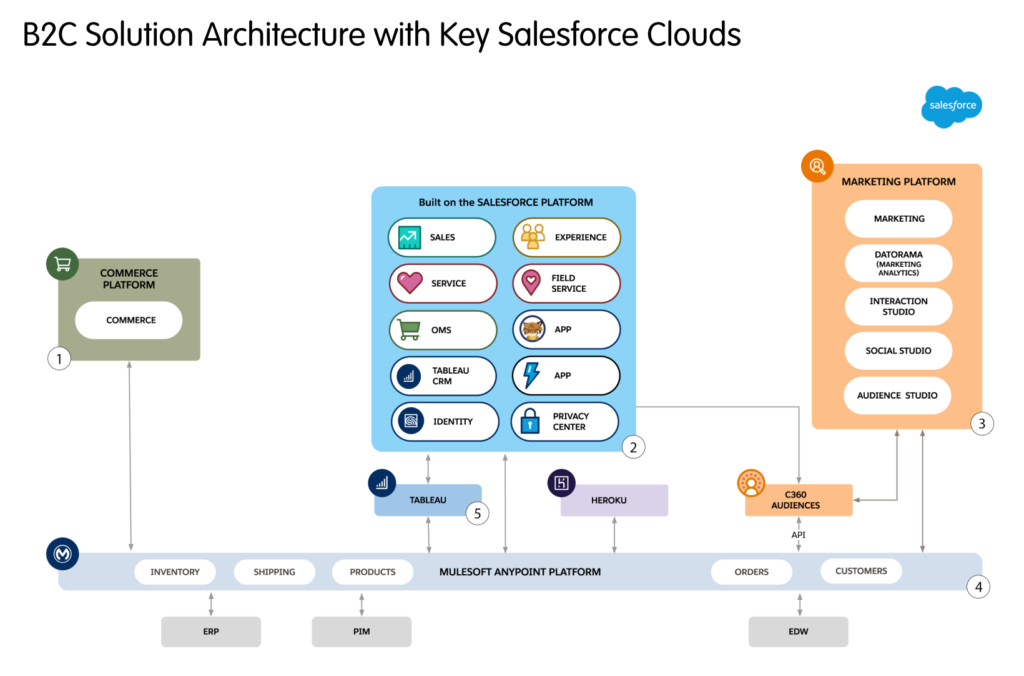
Image Source: Salesforce Customer 360 Guide for Retail
The Salesforce Retail B2C architecture operates on three scalable platforms: Commerce, Salesforce, and Marketing. The Commerce Platform (1) is designed for web and mobile eCommerce. The Salesforce Platform (2) hosts various products like Sales, CRM Analytics, Service, Communities, Order Management System, and Customer 360. These products share a common data model and can integrate with other platforms via APIs. The Salesforce Platform handles customer master and consent management, while the Order Management System (OMS) runs natively on it. CRM Analytics is suitable for Sales and Service analytics, and Customer Identity provides SSO and authentication management. Customer 360 Privacy Center manages data privacy and consent compliance, while Data Cloud unifies and segments marketing data for personalized messaging.
Additionally, the Marketing Platform (3) includes a Marketing Cloud for personalization, journey orchestration, and cross-channel messaging. Datorama provides in-depth marketing analytics, Interaction Studio offers real-time interaction management and AI-driven recommendations, Social Studio handles social monitoring and interaction, and Audience Studio creates complete customer profiles across different data sources.
Furthermore, MuleSoft Anypoint Platform (4) provides API management and system-to-system integration, while Tableau serves as a business intelligence analytics tool. MuleSoft can integrate third-party systems like ERP, PIM, and EDW with Salesforce.
Tableau (5), as part of the ecosystem, enables cross-cloud actions for advanced use cases such as abandoned cart management and personalized marketing recommendations.
Salesforce Main Solutions List for the Retail Industry
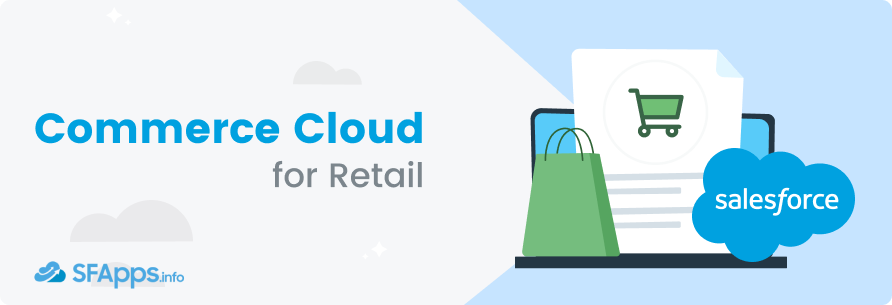
Commerce Cloud for Retail
- B2B and B2C Solutions: Tailors world-class e-commerce solutions for B2B, B2C, and B2B2C (direct-to-consumer) companies, allowing them to create personalized and engaging online shopping experiences.
- Core Capabilities: Features three main capabilities – B2B Commerce, B2B2C Commerce, and B2C Commerce. These functionalities aid customers in crafting and implementing their commerce strategies at a comfortable pace, customized to their specific needs.
- Cloud-Based Suite: Operates as a cloud-based suite of products enabling the setup of e-commerce sites, automation enhancement, and provision of seamless shopping experiences for customers. It integrates with the Salesforce Customer Success Platform, powering all connected Salesforce apps.
- Formerly Demandware: Previously known as Demandware, this software-as-a-service (SaaS) eCommerce platform unifies retailer-customer engagement across various channels and devices, including social media, web, in-store, and mobile.
Flexibility and Scalability: Touted for its flexibility and scalability for enterprises, it offers robust merchandising tools like sorting, filtering, image zooming, and more, alongside inventory management capabilities.
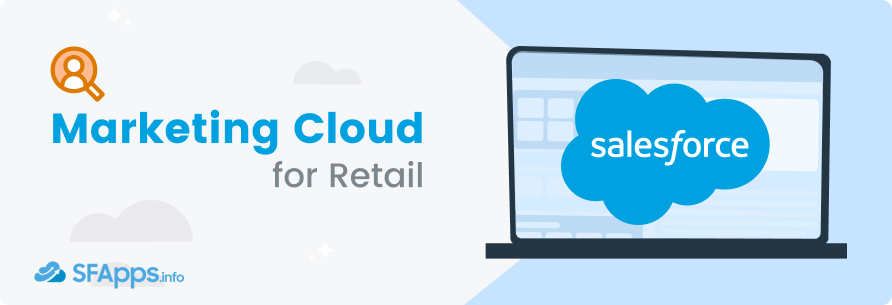
Marketing Cloud for the Retail Industry
- Digital Marketing Platform: Automates marketing across various channels like email, social media, mobile apps, SMS, and websites. It’s a centralized system for sending personalized messages at optimal times.
- Marketing Automation: Includes email marketing, content creation and management, SMS, mobile push notifications, social media marketing, campaign automation visualization, targeted advertising, website personalization, and powerful segmentation.
- Modules and Technologies: Features Studios for managing content and channels, and Builders for data and campaign automation. Also includes new technologies like Marketing Cloud Einstein for AI enhancements, Audience Studio for data capture and segmentation, and Marketing Cloud Intelligence for analytics.
- Flexibility and Connectivity: Not built on the core Salesforce platform; uses connectors for data syncing. Offers a flexible, feature-rich product suite that’s tough to grasp but powerful once mastered.
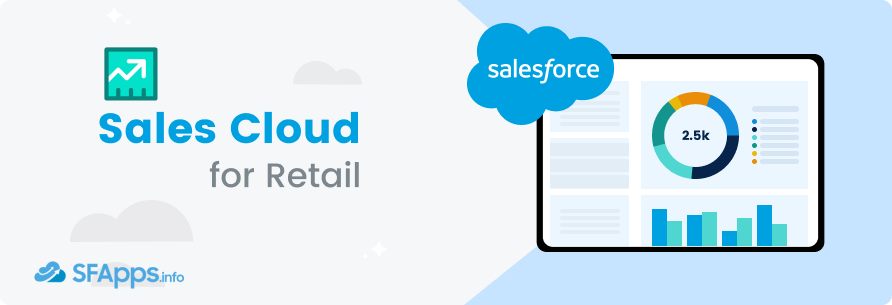
Sales Cloud for Retail Companies
- Tools and Technologies for Sales Teams: Enhances efficiency and effectiveness with features like lead, pipeline management, forecasting, AI insights, coaching tools, and connectivity to channels like telephony and LinkedIn InMail.
- Types of Sales Channels: Caters to various sales channels including outside sales, inside sales, partner sales, and self-service.
- Efficiency Features: Includes core sales force automation, channel sales, sales bots, Configure, Price, Quote (CPQ), and billing functionalities.
- Analytics and AI: Offers forecasting, pipeline inspection, revenue intelligence, Sales Cloud Einstein for AI insights, and Salesforce Inbox for integrating email and CRM data.
- Automated Processes: Includes Sales Engagement for rep productivity, Seller Enablement, Sales Planning, Subscription Management, and Slack collaboration tools integrated with Salesforce automation.
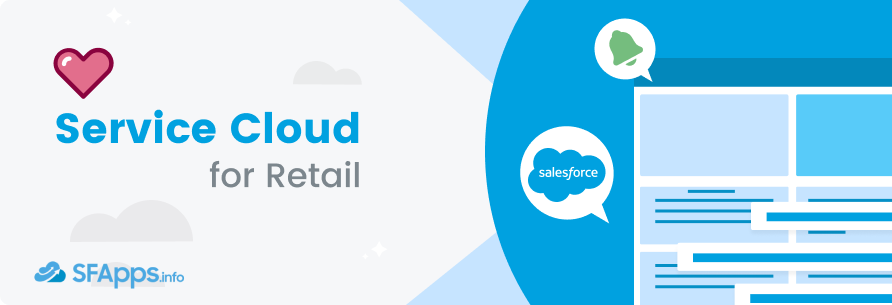
Service Cloud for Retail and Consumer Goods
- Personalized, AI-powered Service and Support: Delivers personalized service across various channels, routing cases to the best agent and providing intelligent recommendations.
- Case Management: Automates case distribution for fast and accurate resolution.
- Field Service Management: Offers remote issue resolution and equips the mobile workforce for swift service delivery.
- Omni-Channel Routing: Intelligently routes work to the right agent based on skill set, availability, and capacity.
- Generative AI-Powered Service Replies: Enhances customer satisfaction with AI-generated replies for efficient communication.
- Knowledge Management: Helps agents and customers find answers quickly, reducing cognitive load.
- AI-Powered Article Recommendations: Boosts productivity by recommending relevant knowledge articles.
- Generative AI-Powered Search Answers with Slack: Facilitates collaboration and automated workflows for efficient case resolution.
- Reports and Dashboards: Provides insights into swarming metrics and their impact on service metrics.
- Customer Service Incident Management: Includes incident detection, resolution, and broadcast communications for proactive incident management.
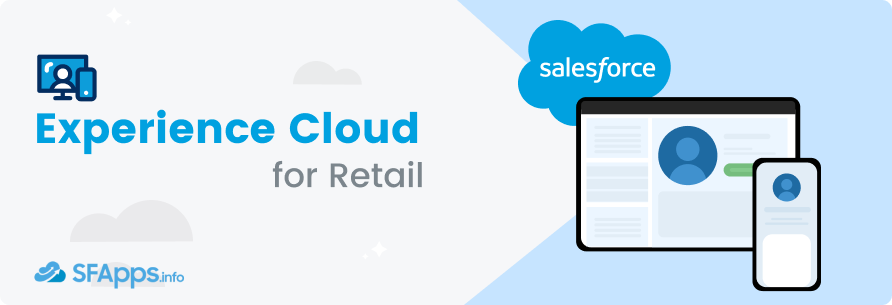
Experience Cloud for Retail Businesses
- Cloud-Based Platform: Connects clients, partners, and employees for secure information and document exchange. It’s adaptable for integration with websites, Salesforce products, or third-party systems.
- Benefits: Increases customer satisfaction, resolves support tickets faster, and enhances onsite user engagement.
- Digital Experience Management: Allows for customized user experiences using CRM data.
- Security: Provides high levels of security and control over user roles, administrative rights, and data-sharing models.
- Case Management & Lightning Flow Automation: Streamlines case lifecycle management and guides customers through business processes.
- Roles, Sharing, and Builder Tools: Offers advanced data protection, document sharing, and design revamp of portals with Experience Builder and Workspaces.
Content Management and Recommendations: Allows for native content creation and storage, structuring around topics, and showing recent recommendations.
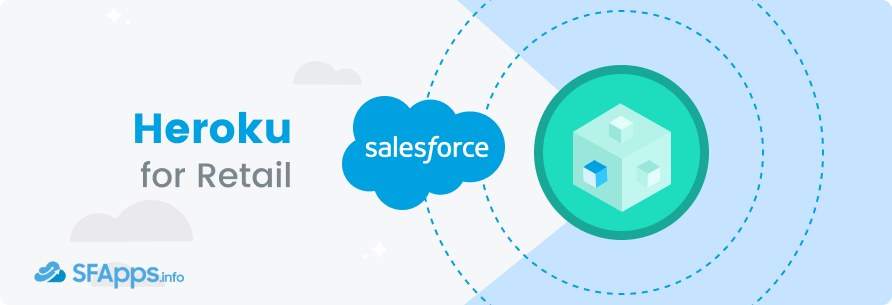
Heroku for Retail
- Cloud Platform as a Service (PaaS): Deploys, manages, and scales modern apps with a focus on allowing developers to concentrate on their core product.
- Integration and Scaling: Offers integration with Salesforce data, supports microservices architecture, and provides scaling options through dynos.
- Elasticity and Data Proxies: Allows quick building and discarding of applications and features powerful data proxies for integrating various data sources without copying data into Salesforce.
Use Cases: Ideal for building web/mobile applications and running complex jobs or microservices that integrate with Salesforce.
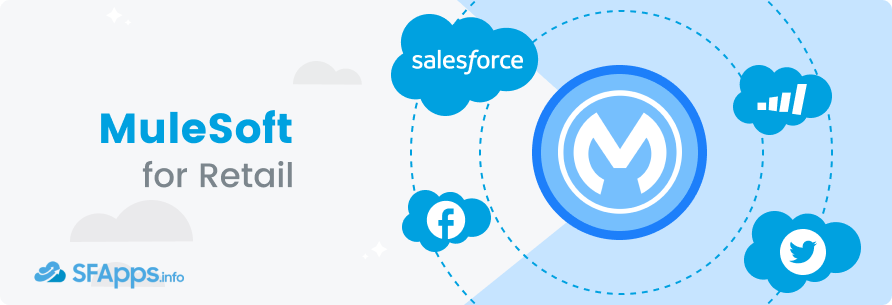
MuleSoft in Retail Salesforce
- Integration and Automation Platform: Offers tools to automate everything including integrating data and systems, automating workflows and processes, and creating digital experiences.
- Unlocking Systems and Data: Uses a composable approach with APIs, iPaaS, and RPA to unlock any data set and integrate any system.
- Automation and Seamless Experiences: Provides tools for IT to build reusable automation and components, creating seamless experiences for customers and employees.
Benefits and Salesforce Integration: Delivers projects faster, freeing up IT time for innovation. Works with Salesforce to unlock data across systems and create connected experiences.
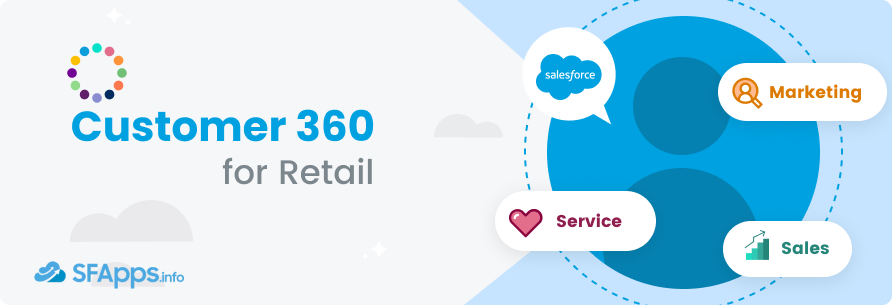
Customer 360 Salesforce CRM for Retail
- Unified Customer Data Platform: Aims to create a single source of truth for customer data, delivering hyper-personalized engagement across various Salesforce clouds.
- Mapping and Resolution: Maps customer records from various Salesforce clouds into a unified view and assigns unique IDs to individuals to resolve multiple records across different systems.
- Connected Experiences: Builds cross-cloud features and experiences, integrating customer data from various touchpoints to deliver connected customer experiences.
- Future Developments: Plans to address data cleanliness across environments, improve Salesforce integrations, especially for B2B with multi-org deployments, and optimize efficiency and ease of use.
How Much Salesforce Implementation in Retail Cost
The costs associated with implementing Salesforce for the retail industry vary based on the scale and specific needs of a business. Expenses typically include subscription fees, customization, integration with existing systems, and training. While the initial investment may be significant, the long-term ROI of increased efficiency and sales often justifies the cost.
Implementing Salesforce in retail can vary widely in cost, from $5,000 to over $100,000, influenced by factors like the agency’s caliber, data volume, customization, and the need for ongoing support. Customizations and integrations can cost $20 to $190 per hour for a skilled developer. Data migration, consulting, user training, and post-launch support are also critical components, each contributing to the total cost.
Specific Retail Solutions: Where Salesforce Retail Services Shine
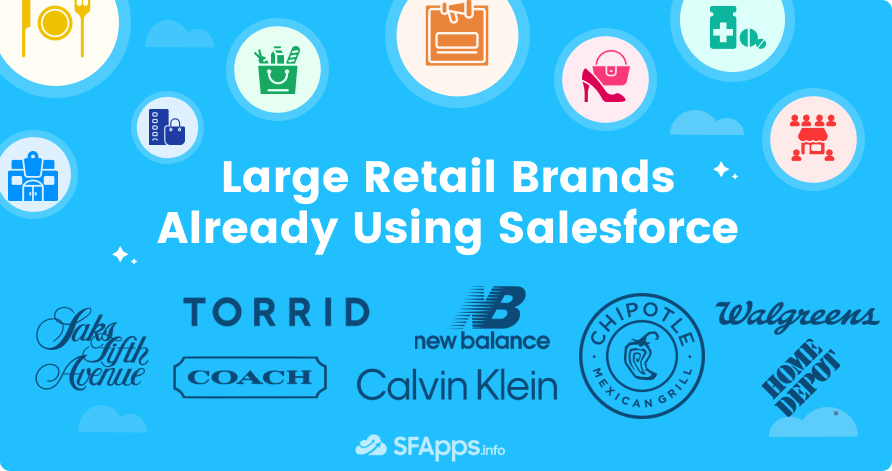
- Fashion: Elevates customer loyalty by enhancing the shopping journey with personalized interactions and tailored solutions. Companies such as Saks Fifth Avenue, PacSun, Calvin Klein USA, Torrid, Coach, and New Balance already use the Salesforce for Retail Industry.
- Restaurants: Connect guest experiences across various channels while boosting collaboration and engagement with franchisees and employees, creating a cohesive dining experience. McDonald’s, Chipotle, and TGI Fridays – deploy Salesforce for personalized marketing and customer service.
- Grocery, Drug, and Convenience Stores: Transforms engagement with shoppers, employees, and store operations through a unified platform, streamlining the retail process and enhancing customer service. 7-Eleven, Aldi, and Walgreens – these companies utilize Salesforce for a better customer engagement strategy.
- Mass Merchants and Department Stores: Optimizes physical and digital shopping experiences by connecting stores and associates, fostering a seamless consumer journey. Macy’s, Home Depot, and Nordstrom – use Salesforce for creating personalized shopping experiences.
- Retail Media: Aim to grow advertising revenue, scale media operations, and optimize campaign performance by activating first-party data, offering a comprehensive solution for retail advertising needs. Comcast, News Corp, Sky UK – these companies implement Salesforce for customer service and media planning.
Must-Have Salesforce Apps for Retail
- Ascent ERP: Unifies team and departmental operations in retail businesses. It facilitates a streamlined process from updating order progress to managing bespoke quotes and confirmed orders. An ideal CRM expansion for various sectors including manufacturing and distribution.
- Eposly: A leading point-of-sale application on Salesforce, Eposly improves customer service by managing inventory, orders, payments, and taxes. It also offers real-time stock level views and geolocation for inventory, enhancing the retail experience.
- Aforza: Offers a comprehensive front-office solution for the consumer goods industry. It utilizes AI and machine learning to enhance product offerings, customer service, and omnichannel presence. Aforza also aids in inventory management and customer service capabilities.
- Bayretail: Enhances in-store experiences by allowing sales associates to manage orders and payments anywhere in-store through a mobile app. It integrates customer service into sales interactions and offers enhanced global business analytics for improved decision-making.
- Vertex Tax Solutions: Empowers your business to stay tax compliant effortlessly. It automates tax calculations and integrates the results into your Salesforce Org. Quick production of tax returns, ready for approval, alleviates the burden of record-keeping. Vertex’s predictive analytics keep you ahead of tax changes, ensuring accurate taxation for every transaction and product pricing. It enhances transparency for customers and staff, ensures compliance, and expedites order processing.
These apps integrate seamlessly with Salesforce’s suite of products to provide a robust and comprehensive solution for various retail sub-niches, enhancing customer engagement, inventory management, and overall operational efficiency. All solutions can be found on AppExchange, Salesforce App marketplace, and additional info about AppExchange can be found on App Analytics Salesforce.
FAQs about Salesforce Retail Execution and Implementation
Let’s find the answers to the most common questions and answers about implementation of Salesforce in retail:
How can retail execution in Salesforce help improve customer satisfaction?
Technology, particularly a unified CRM system, such as Salesforce, can enhance customer satisfaction by linking digital and physical retail channels. This integration creates a comprehensive customer profile, ensuring a consistent and personalized shopping experience across all platforms.
What are the benefits of hiring a salesforce retail consultant?
Hiring a Salesforce retail consultant offers strategic, tailor-made solutions, efficient integration, and expert guidance to maximize the platform’s potential. They focus on data security, provide ongoing support, ensure cost-efficiency, and plan for scalable growth. Consultants address problems proactively, enhance user adoption, offer deep business analysis, develop strategic roadmaps, monitor performance for improvement, manage change effectively, prioritize customer relationships, and adapt to industry trends, ensuring your business remains competitive and agile.
What are the benefits of using a retail CRM system?
Efficient CRM software in retail blends analytics, customer engagement tools, AI, automation, and personalization, creating seamless customer journeys that boost loyalty. It centralizes data from various sources, providing a complete view of every customer interaction. This enables personalized offers and smarter marketing, enhancing loyalty and sales. For instance, CRM insights can re-engage high-value customers with targeted promotions. Automation streamlines manual tasks like data entry, allowing focus on high-value activities. Key features include order management, real-time monitoring, a 360-degree customer view, predictive analytics, and omnichannel support, all crucial for modern retailing.
How does Salesforce enhance customer engagement in the retail industry?
Salesforce boosts customer engagement by providing personalized experiences through Marketing Cloud, facilitating targeted communications, and ensuring seamless customer service with Service Cloud. The platform’s data-driven insights help retailers tailor their offerings and interactions to meet customer expectations better.
Can Salesforce integrate with in-store retail systems?
Yes, Salesforce can integrate with in-store systems through apps like Eposly, which connects Salesforce retail point of sale data to customer profiles, allowing retailers to offer a unified shopping experience across all channels.
How does Salesforce in the retail industry help with inventory management?
Salesforce aids in inventory management through apps like Ascent ERP, which tracks stock levels in real time and integrates this information with other business processes, ensuring efficient operations and helping retailers avoid stockouts or overstock situations.
How can I implement Salesforce Retail Cloud?
Currently, you can’t implement Retail Cloud Salesforce, as it does not exist yet, please use other Salesforce products and tools as described before.
In Conclusion,
The retail industry has undergone significant changes, especially in the wake of COVID-19’s impact. In this evolving landscape, Salesforce has emerged as a crucial element, offering innovative tools like Einstein AI to provide deeper customer insights and enhance inventory management. Retailers can now forge deeper connections with their customers, offering personalized services and maintaining a competitive edge in the market. Salesforce is more than just a tool; it’s a transformative force for retail businesses that are determined to succeed in this new era.
In retail, the journey of a customer relationship can be divided into seven distinct phases, ranging from initial awareness and acquisition to the intricacies of corporate management. Each phase is integral, and addressing critical aspects such as data utilization, business relationship transformation, customer loyalty, omnichannel presence, and the redefinition of store roles at each stage is essential for achieving retail success.
At the heart of Salesforce CRM is the ability to understand and respond effectively to customer preferences. It harnesses clean data and intelligent profiling and segmentation to enhance marketing efforts and improve customer service. By connecting all members of the sales team and providing them with the necessary information, Retail Salesforce CRM plays a pivotal role in enhancing customer satisfaction and fostering loyalty.
For retailers considering Salesforce solutions, it’s important to understand your organization’s capability and maturity to select the right solutions and products that are tailored to your specific needs. The Salesforce Retail architecture, encompassing Commerce, Salesforce, and Marketing platforms, offers a robust and scalable solution to meet the demands of modern retail.

Dorian is a 6X Certified Salesforce Developer and Administrator with a start in the IT world as a CRM Admin in 2020. Since diving into Salesforce in 2021 via Trailhead and Focus on Force, he has achieved a Ranger Rank, earned several Superbadges, and bagged certifications including the Salesforce Certified Administrator, Platform App Builder, Associate and Platform Developer I by 2023. In 2024 he also became Salesforce Certified AI Associate and earned Certified AI Specialist Certification in 2025. Dorian is very keen on continuous learning, always looks for fresh ways to improve his knowledge. He enjoys running, boxing, kickboxing and reading diverse kinds of books in his free time.


 Previous Post
Previous Post Next Post
Next Post
2 Responses to “Salesforce Retail Implementation Guide”